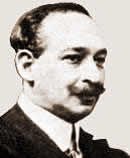José Ingenieros
José Ingenieros , actually Giuseppe Ingegnieri , (born April 24, 1877 in Palermo , Sicily , † October 31, 1925 Buenos Aires ) was an Argentine philosopher, physician and writer of Sicilian origin.
Life
Ingenieros was the son of Salvatore Ingegnieri and his wife Mariana Tagliavia. When he was eight, Ingenieros emigrated to Argentina with his father. In Argentina, Ingenieros then changed his name to José Ingenieros . From 1888 he attended the Colegio Nacional in Buenos Aires under the direction of Amancio Alcorta . He then studied medicine at the Universidad de Buenos Aires (UBA) and was able to successfully complete this course in 1900 with the dissertation "Simulación en la lucha por la vida". Ingenieros dealt with psychiatry and criminology from an early age. He followed the theory of the Italian Cesare Lombroso of the "born criminal." During his studies he had already become a member of the Social Democratic Party of Argentina ; Among other things, he made the acquaintance of the writer Mario Bravo there .
In 1897 Ingenieros had founded the politically left-wing magazine “La Montaña” together with Leopoldo Lugones . Due to the series of articles "Reptiles burgueses" it was soon banned.
In 1902 Ingenieros became a lecturer at the Institute of Neuropathology and Director of the Archives of Psychiatry and Criminology (until 1913) of the University of Buenos Aires. In 1904 Ingenieros was entrusted with a chair in psychology (UBA). Due to political disputes, President Roque Sáenz thwarted Peña Ingenieros' appointment as professor of forensic medicine. Thereupon the latter abandoned all his duties and obligations and undertook an extensive study trip to and through Europe. For a long time he stayed in Geneva , Heidelberg , Lausanne , Madrid and Paris . Among other things, he visited various professional colleagues at the local academies and universities and discussed various issues with students.
Ingenieros married Eva Rutenberg in Lausanne and had four children with her: Delia, Amalia, Julio and Cecilia.
In 1914 Ingenieros returned to Argentina and founded the "Philosophical Seminar" at the University of Buenos Aires. In 1915 he was instrumental in founding the magazine "Revista de Filosofía" and four years later he started the book series "La Cultura Argentina"; in which over 150 volumes were published. In 1919 he stopped teaching in order to devote himself more to politics. Ingenieros represented progressivist to communist positions and proposed the establishment of an anti-imperialist Latin American Union in 1922 . In order to have a mouthpiece for his socialist / sociological ideas, Ingenieros founded the magazine “Renovación” in 1923 together with his student Aníbal Ponce .
José Ingenieros died at the age of 48 on October 31, 1925 in Buenos Aires, where he found his final resting place.
Fonts
Single issues
- La psicopatología en el arte. Buenos Aires 1902.
- La simulación de la locura. Buenos Aires 1903.
- La simulación en la lucha por la vida. 1904.
- Patología del lenguaje musical. Paris 1906.
- El hombre mediocre. Madrid 1913.
- Principios de psicología. 1916.
- Ciencia y filosofía. Madrid 1917.
- Proposiciones relativas al porvenir de la filosofía. 1918.
- La locura en la Argentina. 1920.
- Los tiempos nuevos. 1921.
- Las fuerzas morales. 1922.
- Crónicas de viaje. 8th edition. 1925.
- Tratado del amor. 1970
Work editions
- Aníbal Ponce (Ed.): Obras completas. 24 volumes. Buenos Aires 1930/1940.
literature
- Sergio Bagú : Vida ejemplar de José Ingenieros. Juventud y plenitud. Claridad, Buenos Aires 1936.
- Enrique Díaz Araujo: José Ingenieros. CA Editorial, Buenos Aires 1998, ISBN 987-507088-2 .
- Manuela Gomez: Rediscovering the philosophical importance of Jose Ingenieros. A bridge between two worlds, José Ingenieros and his impact. VDM, Saarbrücken 2008, ISBN 978-3-639-01383-2 .
- Félix Luna (Ed.): José Ingenieros. Planeta, Buenos Aires 2000, ISBN 950-49-0359-2 .
- Oscar R. Marti: The reaction against positivism in Latin America. A study in the philosophies of Carlos Vaz Ferreira and José Ingenieros. Dissertation. University Press, New York 1978.
- Dieter Reichardt: Author Lexicon Latin America. Suhrkamp, Frankfurt am Main 1994, ISBN 3-518-38828-2 , pp. 69-70.
- Oscar Terán: José Ingenieros. Pensar la nación. Alianza Editores, Madrid 1986, ISBN 950-40-0020-7 .
- Hugo Vezzetti: Aventuras de Freud en el país de los argentinos. De José Ingenieros a Enrique Pichon-Rivière . Paidós, Buenos Aires 1996, ISBN 950-12-7026-2 .
Individual evidence
- ↑ a b c d Leopoldo Acuña, Buenos Aires: José Ingenieros , in: Wolfgang U. Eckart and Christoph Gradmann : Ärztelexikon. From antiquity to the present , 1st edition 1995 CH Beck'sche Verlagsbuchhandlung Munich, 2nd edition 2001, 3rd edition 2006, each Springer Verlag Heidelberg, Berlin, New York. doi : 10.1007 / 978-3-540-29585-3
| personal data | |
|---|---|
| SURNAME | Ingenieros, José |
| ALTERNATIVE NAMES | Ingegnieros, Giuseppe |
| BRIEF DESCRIPTION | Argentine philosopher, physician and writer |
| DATE OF BIRTH | April 24, 1877 |
| PLACE OF BIRTH | Palermo |
| DATE OF DEATH | October 31, 1925 |
| Place of death | Buenos Aires |
